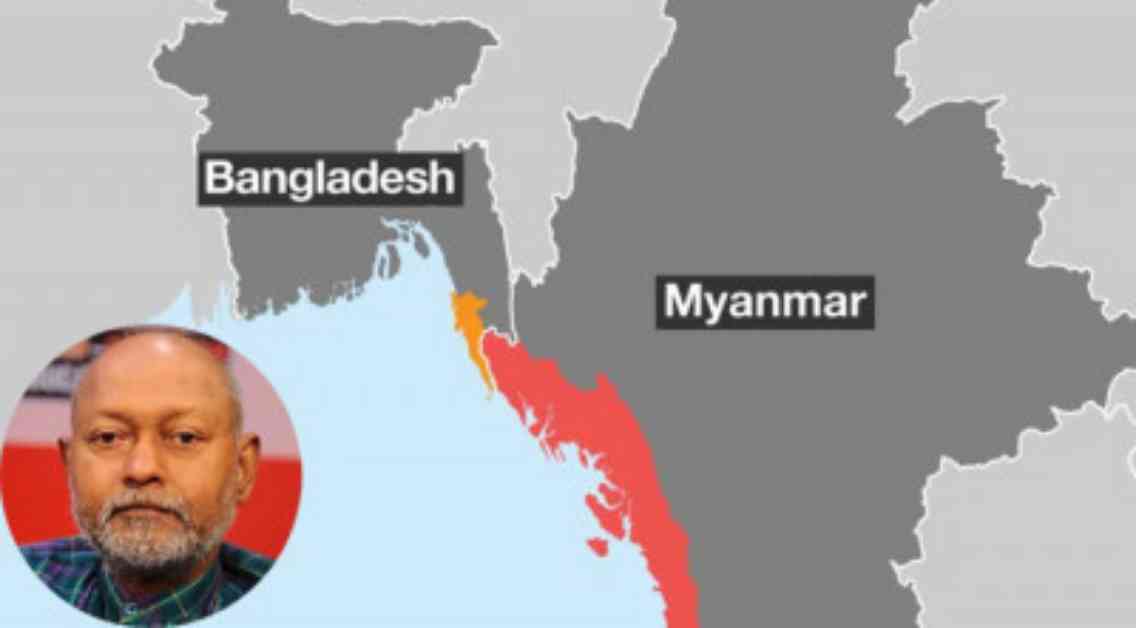Rohingya Crisis: A Closer Look
In the tumultuous state of Rakhine in Myanmar, the majority is now under the control of the Arakan Army after intense fighting with the Myanmar military. The very military that has been accused of genocide in this state has driven hundreds of thousands of Rohingya refugees to seek shelter in Bangladesh.
Recently, the Secretary-General of the United Nations, Antonio Guterres, broke bread with Rohingya refugees in Cox’s Bazar during Ramadan. This gesture has sparked discussions about establishing a “humanitarian corridor” in Bangladesh to provide international assistance to the distressed in Rakhine. Even the Bangladesh Air Force has called on the military to be prepared for war, as stated by the Chief Adviser, Dr. Mohammad Yunus. These matters are being closely monitored and discussed by the alert public.
The resolution of the Rohingya crisis, the potential escalation of internal conflict in Rakhine, the pros and cons of the humanitarian corridor, the implications of Dr. Yunus’s war readiness statement, and the possible involvement of Bangladesh in the Rakhine conflict are all raising questions in both political and diplomatic circles. In-depth discussions on these topics have taken place with researcher, educator, and political analyst, Dr. Nazmul Ahsan Kalimullah, in an exclusive interview with Bengali News. The discussion was facilitated by the esteemed editor, Tauhidul Islam Mintu, and senior reporter Pinky Akter.
Humanitarian Corridor: What’s the Big Deal?
When asked about the government’s decision to establish a humanitarian corridor, Dr. Kalimullah hesitated to provide a clear answer. He emphasized the sensitivity of the issue and the lack of clarity due to the absence of a parliament in the country. He suggested that the government might not be ready to make definitive statements on the matter at this time. However, he acknowledged the importance of considering the issue from a humanitarian perspective to provide shelter for the Rohingya refugees.
The discussion then shifted to the recent statements made by foreign policy advisers regarding certain matters that the government wants to clarify. Dr. Kalimullah hinted that these advisers might have positive views on the government’s policies.
Who Benefits from the Corridor?
When asked about the potential beneficiaries of the humanitarian corridor, Dr. Kalimullah highlighted the Arakan Army and the indigenous populations living in the controlled areas. He explained that the Arakan Army and the locals are the primary inhabitants of the controlled region.
India’s Role in the Crisis
Dr. Kalimullah commented on India’s neutral stance, emphasizing that they prefer to maintain their impartiality in their dealings with the central government. He noted that India’s role is crucial in resolving the crisis in Myanmar and providing assistance to Bangladesh.
China’s Role in the Region
Discussing China’s role, Dr. Kalimullah highlighted their consistent support for Myanmar’s central government. He emphasized that China’s involvement in resolving the crisis between Myanmar and Bangladesh is uncertain. However, he mentioned that China could play a significant role if the situation in Myanmar mirrors the conflict in Bangladesh.
The Ethnic Composition of Rakhine
Addressing the issue of the ethnic composition of Rakhine, Dr. Kalimullah referred to the settlement of the ‘Burmese’ diaspora from Israel in the region. He speculated that if the region becomes a separate state, it could accommodate a diverse population of Jews, Christians, Buddhists, and Muslims. He expressed doubts about the provision of arms to the combatants in the conflict.
India’s Security Concerns
Dr. Kalimullah highlighted India’s regional surveillance, emphasizing their efforts to maintain their territorial integrity. He noted that India is vigilant about protecting its unity in the face of potential border violations.
Potential for Conflict Escalation
Discussing the potential for conflict escalation, Dr. Kalimullah raised concerns about the impact on Bangladesh’s national security if the Rohingya crisis intensifies. He warned that any incursion by the Arakan Army into the Rohingya camps could provoke a response from Bangladesh, leading to a deterioration of national security.
Impact of the Humanitarian Corridor
When asked about the potential impact of the humanitarian corridor, Dr. Kalimullah noted that the government has already taken steps to establish the corridor. He suggested that the government might benefit from maintaining a state of war readiness. However, he cautioned that any prolonged conflict could pose challenges for the interim government.
The Role of Dr. Khalilur Rahman
Dr. Kalimullah shed light on Dr. Khalilur Rahman’s appointment as a national security adviser to oversee the Rohingya issue. He explained that Dr. Rahman’s role is to monitor the situation closely and provide guidance on national security matters.
The Political Implications
Dr. Kalimullah expressed concerns about the political implications of the Rohingya crisis on the upcoming elections. He emphasized the need for a swift resolution to the crisis to avoid disruptions during the election period.
In conclusion, the Rohingya crisis remains a complex issue that requires careful consideration and diplomatic efforts to ensure a peaceful resolution. The involvement of various stakeholders, including neighboring countries and international organizations, is crucial in addressing the humanitarian crisis in Rakhine and providing support to the displaced Rohingya refugees.
























